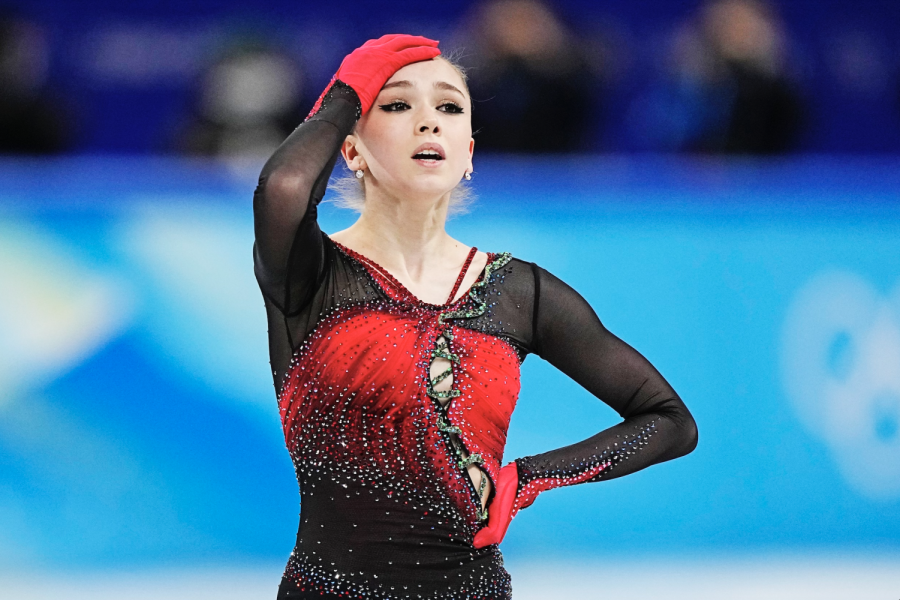Doping Scandal Shines Light on Abusive Practices in the Figure Skating World
February 27, 2022
In 1984, 23-year-old Canadian skater Brian Orser became the first athlete in Olympic history to complete a triple axel. Fourteen years later, 26-year-old Surya Benali made history by landing a backflip at the 1998 Winter Olympics in Nagano, Japan. This month, the 2022 Beijing Winter Olympics welcomed a new star whose name has dominated the figure skating competition for weeks now. Kamilla Valieva, just 15 years old, grabbed the attention of thousands of viewers by becoming the first woman in history to land a quad jump at the Olympics. She completed a second quad – an incredible feat – just seconds later. Valieva stole the headlines the following morning and garnered millions of views on YouTube. Her fame and stardom vanished a few days later when a drug test came out positive. Valieva has since been scrutinized by Olympic athletes and media outlets. Yet her coach, Eteri Tutberidze, who has a history of abusive practices, has received little to no media attention.
Valieva’s drug test, submitted prior to the Olympics in December, came back positive for trimetazidine, a banned substance that improves cardiovascular capacity. The drug might have explained her ability to perform two of the hardest jumps in the sport of figure skating seamlessly. The test results come as a surprise to thousands who found her ability to execute jump after jump exhilarating, but others are experiencing déjà vu. Russian Olympic athletes have been caught doping before, reaching a point so bad that Russia received a two-year ban–December 17, 2020, to December 17, 2022–from competing in the Olympics. Despite the World Anti-Doping Agency’s rule that no athlete is allowed to compete under the Russian flag, the nation discovered a loophole: Russian athletes can compete under the title of “The Russian Olympic Committee.” Valieva has shown her exceptionality in other ways outside of the rink; unlike most athletes caught doping, she was cleared to continue skating. The Court Arbitration for Sport ruled that she would be allowed to compete due to her protected status as a minor. The decision has caused an immense backlash in the Olympic community, especially from 21-year-old summer Olympian Sha’Carri Richardson, who was banned from competing after traces of THC were identified in her system.
Tutberidze has raised countless Olympic stars from the ground up, most of them becoming champions before the age of 18. One of the most sought-after coaches in Russia, she turns out success stories by the dozen. Olympic Champion Yulia Lipnitskaya, silver medalist Evgenia Medvedva, Alina Zagitoba, and other renowned athletes that dominate the ice were all trained by Tutberidze. Yet, behind the medals and achievements lies a much more sinister picture.
Yulia Lipnitskaya revealed that she had been suffering from anorexia for multiple years, heightened especially by Tutberidze who encouraged her to sustain herself through powdered nutrients as opposed to real food.
Another one of Tutberidze’s adolescent stars, 15-year-old Alina Zaigotova, made a striking comment in regards to Tutberidze restricting her diet: “Generally, I restricted myself during the Olympic Games. I was, you can say, not drinking water at all. That is, we just rinsed our mouths and spit it all out.” Lipnitskaya and Zagitova have since retired from the sport, both of them only around 20 years old.
Combined with the 12 hours of training a day, the physically taxing sport of figure skating leads to frequent injuries that skaters power through. Especially for young skaters who appear to not be eating enough, fractures, muscle tears, and lacerations can have long-lasting effects on the body.
Steroids, pain killers, and other illegal substances might provide the solution for these injuries. There have been previous allegations of doping in Tutberidze’s school, and it would not come as a surprise if Valieva has become the next victim.
Whether or not Valieva should be allowed to compete is debatable, but it is important to keep Tutberidze’s history of encouraging eating disorders and other abusive practices in mind when questioning the extent of Valieva’s involvement in the ordeal. Tuberidze’s previous doping allegations all point to the possibility that Valieva either did not know she was doped, or she knew but did not challenge what the adults in her life told her. After all, how many 15-year-olds would question adults’ authority?
The spotlight remains on Valieva, but what truly should be brought under scrutiny is the adults in her life pulling the strings behind the scenes.
Whether Valieva was aware that she was taking drugs, or was compliant with the ordeal, there is an abundance of evidence pointing to abusive practices coming from coach Eteri Tutberidze, recipient of the “best coach” award by the International Skating Union. Statements from previous students shine a light on the experiences that skaters have endured under Tutberidze’s wing, and it is far from unlikely that Valieva shares their experience.




Cessa Lewis • Mar 11, 2022 at 4:51 pm
Wow, Laura this really got me thinking! I can’t believe how horribly young figure skaters are being treated. Thank you for bringing this to our attention!